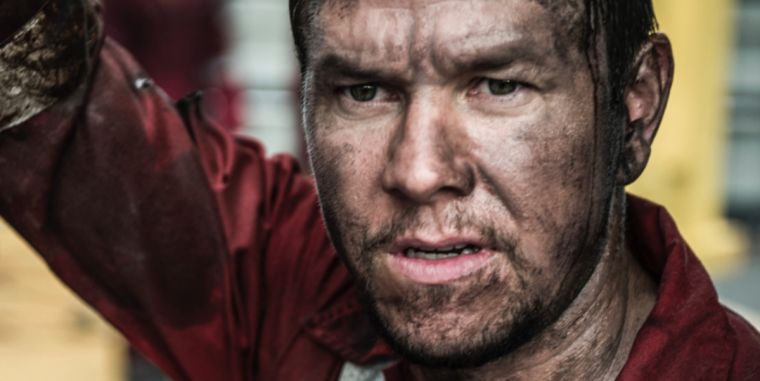Deepwater Horizon: Mark Wahlberg's New Film Draws A Line Between Blind Faith And Christian Hope

It's mercifully difficult to spoil a film based on a true story, especially one from recent history. So let me begin at the end of Deepwater Horizon, the Mark Wahlberg-fronted, $150m blockbuster: it contains one of the most profound moments of prayer ever portrayed on the big screen. And what's interesting considering the disaster-movie context is that this doesn't take place as the protagonists beg for divine mercy, but as the survivors mourn their dead.
Thirty or more oil riggers, led by a badly-wounded Kurt Russell, stop and 'take a knee'; loudly proclaiming The Lord's Prayer. It's an image of extraordinary, resilient hope, and that's exactly what Deepwater Horizon is all about.
Peter Berg's film charts the story of the eponymous oil rig, the 2010 explosion of which was the epicentre of America's biggest ever oil spill. Wahlberg plays Mike Williams, the electrical officer who took a heroic central role in rescuing several of his colleagues, and in later giving evidence as the disaster was investigated. Williams is portrayed as the consummate family man, driven – and driven to survive – by his love for his wife (Kate Hudson) and daughter. But he's also a man who understands and describes the difference between hope and recklessness; a distinction that the senior staff of BP – including an especially villainous John Malkovich – fail to draw.
As the film has it, the BP executives use 'hope as a tactic', allowing greed to drive their assumptions that missed safety measures and worrying test readings probably won't have tragic consequences. Like (as Williams puts it) 'a man who doesn't visit the dentist so that he'll never get bad news', they persist with their operation with a blind faith that disaster won't strike. History already tells us that their 'faith' was misplaced.
For some people perhaps, this is a good definition of religious belief: a sort of fingers-crossed approach that there's more to life than what we see. Yet through characters like Williams (and Russell's 'Mr Jimmy'), Deepwater Horizon does a great job of illustrating the sort of deeper, more profound hope on which Christian faith is based. These characters are 'sure of what they hope for, and certain of what they do not see' (Hebrews 11 v 1); their beliefs are rooted in considered faith and deep love.
Aside from the interesting themes, Deepwater Horizon is at times a stunning disaster movie. There's a slightly mumbly and confusing first half hour too loaded with authentic oil rigging terminology, but once it inevitably gets going, there's a relentless hour of fiery action sequences and heart-wrenching acts of true-life heroism. Wahlberg is an unexpectedly complex and compelling lead, not least when he finally steps back on to dry land, and Berg does a good job of allowing small moments of emotion and humanity in the midst of the prevailing chaos.
The film also leaves the viewer in no doubt that as usual, the love of money is the root of evil. As the final captions reveal, the indicted oil executives ended up walking away without consequence once the media lost interest; the resurgent publicity around the film will be more damaging to BP's reputation than a Wild Bean Cafe panini. The fact remains though that money drives organisations - and indeed individuals, to turn away and absolve themselves of possible consequences; to hope that their dubious actions won't have disastrous consequences. That's quite a challenge, and not just for those in charge of oil rig safety. Perhaps at times we all defer to the wrong kind of hope.
Martin Saunders is a Contributing Editor for Christian Today and the Deputy CEO of Youthscape. Follow him on Twitter @martinsaunders.











